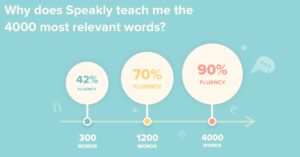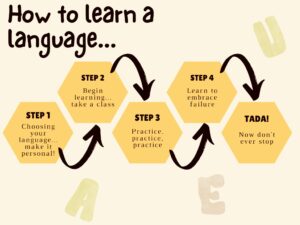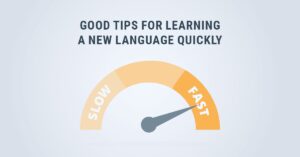How to Learn a New Language Quickly: The Ultimate Guide
In this guide, we’ll walk you through actionable steps, common mistakes to avoid, best practices, and even insights from polyglots who’ve mastered multiple languages—all designed to help you become fluent faster than you thought possible.

The Challenge of Learning a New Language
Many people start learning a new language but give up within a few weeks. Why? Because traditional methods like classroom learning or outdated apps don’t always match how our brains absorb new information.
Learning a new language requires consistency, motivation, and the right strategy. Without a clear plan, it’s easy to feel overwhelmed by grammar rules, vocabulary lists, and pronunciation challenges.

Step-by-Step Guide to Learn a New Language Fast
1. Set Clear, Measurable Goals
Define what fluency means to you. Is it conversational ability in three months? Reading newspapers in six? Setting SMART goals keeps you focused and motivated.
2. Immerse Yourself Daily
- Change your phone and browser language settings
- Listen to podcasts or music in the target language
- Label household items with their foreign names
3. Master High-Frequency Vocabulary First
Start with the most commonly used words—around 100 words can cover 50% of daily conversations. Tools like Anki or Quizlet are great for spaced repetition learning.

4. Speak From Day One
Don’t wait until you “feel ready.” Use platforms like iTalki or Tandem to practice speaking with native speakers early and often.
5. Think in Your Target Language
Force yourself to think in the language you’re learning. Describe your surroundings, narrate your actions, and try to avoid translating in your head.

Best Practices for Faster Language Acquisition
Use the Power of Storytelling
Stories help you remember vocabulary naturally. Read short stories or watch TV shows in your target language with subtitles.
Review Smartly, Not Hard
Spaced repetition systems (SRS) like Anki or RemNote help you review only what you’re about to forget, making learning efficient and long-lasting.
Track Your Progress
Set weekly benchmarks and use apps like Beelinguapp or Duolingo to track your progress visually.
Find a Language Learning Buddy
Having someone to practice with makes the process fun and accountable. Join local meetups or online communities like Reddit’s r/languagelearning.
Common Mistakes to Avoid When Learning a Language
Mistake #1: Overloading with Grammar Rules
Too much grammar too soon can kill motivation. Focus on practical usage first, then dive into grammar later.
Mistake #2: Learning Alone All the Time
Isolation slows down progress. Engage with others—even if it’s just typing in a chat room or joining a Zoom group.
Mistake #3: Expecting Immediate Results
Language learning is a marathon, not a sprint. Celebrate small wins like ordering food or writing a simple sentence.
Expert Insights: What Polyglots Do Differently
“The key isn’t talent—it’s strategy. Successful language learners make mistakes, correct them, and move forward. They don’t fear sounding silly.” – Benny Lewis, Fluent in 3 Months
Experts recommend focusing on communication over perfection. Here’s what top language learners do differently:
- They speak every day, even imperfectly
- They set mini-milestones (e.g., “I will order food in Spanish this week”)
- They keep a language journal to track thoughts and phrases
FAQ: Frequently Asked Questions About Learning a New Language
How long does it take to learn a new language?
It depends on the language and your effort level. With consistent practice, basic fluency can be achieved in 3–6 months.
What’s the fastest way to learn vocabulary?
Use flashcards with spaced repetition (like Anki), and practice new words in sentences immediately.
Can I teach myself a new language without classes?
Absolutely! Many successful polyglots are self-taught using apps, books, and conversation partners.
Do I need to live in a country to learn its language?
No, though immersion helps. You can simulate immersion at home with media, apps, and virtual tutors.
Which language should I learn first?
Choose one that aligns with your interests, career goals, or heritage. Motivation is key!
Final Thoughts: Start Today, Speak Tomorrow
Learning a new language doesn’t have to be slow or boring. By combining smart strategies, consistent practice, and the right mindset, you can master a new language faster than ever before.
If you found this guide helpful, share it with a friend who wants to learn a language too. And don’t forget to leave a comment below with your language learning journey—what worked, what didn’t, and where you’re headed next!
